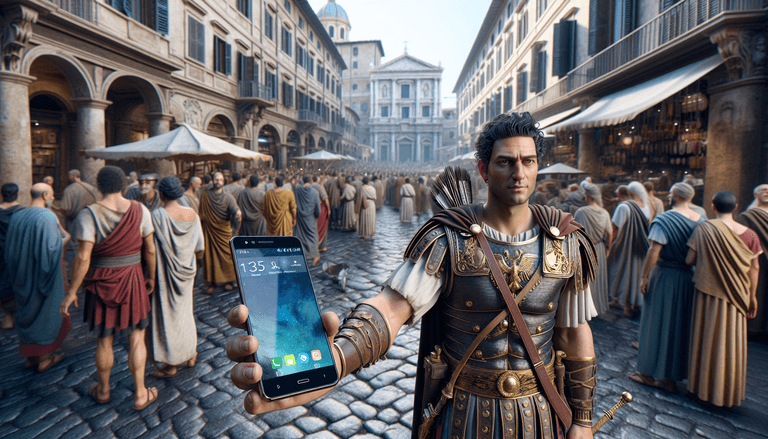Ah, the ides of March! What if, instead of being assassinated in the Senate, Julius Caesar had wielded the power of a modern smartphone to steer clear of political daggers and instead cut new paths for his ambitious conquest of Rome? Hold onto your togas, dear readers, as we delve into this whimsical exploration of ancient history colliding with today's technological wizardry.
The Roman Empire: There's an App for That
Imagine Julius Caesar swanning around with the latest smartphone, perhaps inscribed in Latin on the back – "Veni, vidi, vici". As he faces the chaotic labyrinth of Roman politics, he could dodge betrayal like a true political gladiator, thanks to an arsenal of apps tailored for a leader of his calibre.
Gmail: Managing an empire is no small feat. Caesar could ditch the cumbersome scrolls and buzzing beeswax tablets, opting instead for the charm of digital communication. With Gmail, managing correspondence with Senators, local governors, and allies would be a cinch. Plus, with labels like "Conspiracies", "Invitations", and "Warnings from Soothsayers" he could keep his inbox strategically organized.
Google Maps: While the expanding roads were impressive, even the most devoted Roman cartographer would tip his laurel wreath to the magic carpet view provided by Google Maps. Caesar could locate distant territories with the swiftness of a Roman courier on Red Bull. Finding the shortest route to keep an eye on rebellious Gaul while popping by the Colosseum for a quick gladiator match? Sorted!
WhatsApp: Now, here's an app fit for a ruler. Group chats could revolutionise Senate meetings. Imagine discussing naval strategy with Pompey the Great or sending a cheeky cypress emoji to Egypt's Cleopatra. Coordinating his legions across conquered territories would be easier than teaching Romans to say "thumbs down."
Swipe Right for Politics
In the realm of Roman alliances and treacheries, Tinder could metamorphose from a mere matchmaking tool to Caesar’s secret weapon. Swipe right for political alliances, swipe left to resist getting entangled with traitorous Senators. His profile would read: "Conqueror of Gaul, Friend of the People, Part-time Writer of the Gallic Wars." Matches made in this forum could lead to new alliances or, if poorly chosen, spectacular backstabs – the perfect plot twists Shakespeare would envy.
The Senate Livestream: Trending Now
Picture this: The Senate is in session, and suspicion bloats the air like an overinflated Roman sculpture. Caesar, always one step ahead, employs Facebook Live. Broadcasting whip-smart speeches, he could assure the plebeians with real-time counterarguments to any Senate mutiny. And let's face it, seeing Brutus squirm on video would become an overnight viral sensation, perhaps rolling into a hashtag campaign: #SenateShenanigans.
Audience engagement would skyrocket as citizens dole out thumbs up, angry faces, and jokes about the latest toga mishaps. Such was the power of social media, capable of rallying Romans quicker than a charioteer on circus day.
An Empire at Your Fingertips
With a smart device in hand, how might Caesar have rewritten his fortunes? Perhaps he might've made his fair share of Instagram reels, showcasing the grandeur of Roman architecture. Would his feed be flooded with selfies alongside the Senate? "Here’s me with Brutus – shifty fellow, don't you think?"
And for reportage, Caesar’s Twitter could spew endless quips worthy of the history books. Just imagine: "The Rubicon? Crossed it as easily as a Sunday stroll. #CasuallyConquering." In short, the smartphone’s capabilities would offer Caesar's larger-than-life persona an unparalleled platform.
Concluding the Timewarp
In this hypothetical tapestry interwoven with smartphones, Roman politics, and Caesar's foresight, it's intriguing to muse on how technology might have recalibrated history’s orbit. Would betrayal still find him on that fateful March evening, or would the flicker of a notification inform him faster than Cimber's dagger? While reality bowed differently to the whims of destiny, contemplating these what-ifs spins the wheel of history anew, dusts off the patina of time, and gives us a refreshing, if not cheeky, glimpse into a modern antiquity.
Regardless, dear reader, as we lock our phones to rest at bed's edge or swipe lazily, let the story of Caesar remind us: Whether you're competing for hashtags or empires, timing – and technology – is everything.







